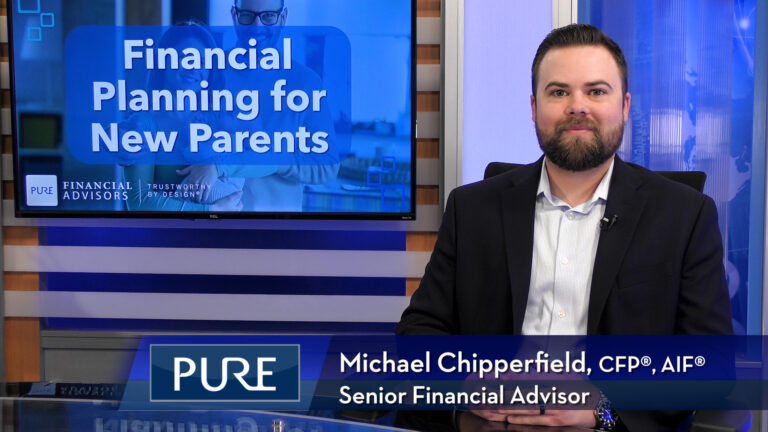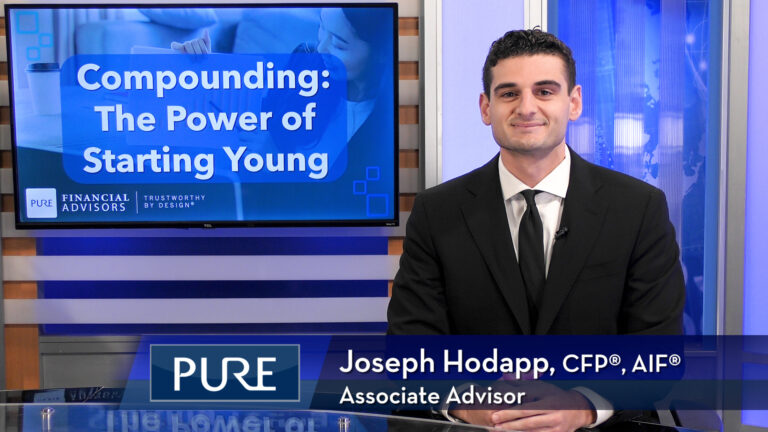Estate planning is a crucial—yet often overlooked—part of financial planning. It serves as a roadmap for what happens to your assets and healthcare decisions if you’re unable to make them yourself. Pure’s Senior Financial Advisor, Kyle Stacey, CFP®, AIF®, breaks down the basics of estate planning and explains why it’s essential for protecting both you and your loved ones.
You learn:
- A trust
- Durable Power of Attorney
- Medical Power of Attorney
- And more
Transcript
Thinking Ahead – Estate Planning Basics
Today I want to talk about something super important—but often overlooked—and that’s estate planning. So, what is estate planning? In a nutshell, it’s a plan for what happens to your stuff, your money, and even your health care decisions if something were to happen to you.
Why Estate Planning Matters
It’s not just about who gets your house or your savings. It’s about making life easier for your loved ones when you’re gone as well—or, if/when you can’t make decisions for yourself, who do you decide to let make those personal decisions for you?
Do you have an estate plan? The short answer to that is yes, everyone technically has an estate plan – it just might not be the one you want. The state that you live in will actually determine if you have no formal documentation of who gets your stuff. And that process is called probate and it can be slow, expensive, and extremely stressful as well for your family. It’s called dying, “Intestate”. One of the biggest challenges with not having an estate plan is the impact it has on your loved ones are going to have. Nothing rips apart a family faster than quarrels over the assets being left behind. A simple estate plan can help mitigate a lot of that.
Key Documents in Estate Planning
So, what’re the key documents inside of an estate plan:
A Trust – helps you avoid probate (that long, court process) and can offer more control and privacy. Most of your essential assets are titled in the name of the trust. Think, your home, investment accounts, businesses, those are the assets that go in there.
A Will
This is a document that dictates who gets the stuff when you die, (dad’s golf clubs, mom’s wedding ring, any family heirlooms, etc. All of those essentially get “poured over” from the trust that you’re not titling in there and the will captures it all.
Durable Power of Attorney
This lets someone make financial decisions for you if in the event that you can’t make it for yourself. So think about if you’re in a coma, you can’t pay your bills. Who’s going to pay your bills for you? They can also help organize your financial life, move money around, things like that.
Medical Power of Attorney
Someone who can make medical choices for you if you can’t based on your wishes
Living Will
This spells out wishes for life-sustaining treatment, like if you’re on life support. This can also be referenced to as the “pull the plug” documentation. What’re your final wishes? This document is very sensitive to many people and we could spend hours going through some of the horror stories of people who have loved ones that knew what their wishes were, but there was no actual form of documentation on what their wishes were.
Beneficiaries
Those are the people named on things like life insurance policies or retirement accounts or even annuities. This is actually separate from your estate plan (think the trust and the wills specifically), but more importantly, they override what’s in your will. So, make sure they’re up to date! Have an IRA? A 401(k)? Or any other retirement accounts? Double check those.
When to Start Estate Planning
Estate planning isn’t just for the elderly. Even if your situation is super simple, having the basics can save your family a whole lot of time and a whole lot of heartache.
Getting Help
Estate planning might sound overwhelming, but it’s really just about protecting the people you love and giving yourself peace of mind. The key is: start somewhere. Even a simple will is better than nothing. But you don’t have to do it all alone. You can work with an estate attorney, use online tools, or take advantage of Pure’s free financial assessment. So take that first step. Your future self and your family will very much thank you.
Subscribe to our YouTube channel.
IMPORTANT DISCLOSURES:
• Investment Advisory and Financial Planning Services are offered through Pure Financial Advisors, LLC, a Registered Investment Advisor.
• Pure Financial Advisors LLC does not offer tax or legal advice. Consult with your tax advisor or attorney regarding specific situations.
• Opinions expressed are subject to change without notice and are not intended as investment advice or to predict future performance.
• Investing involves risk including the potential loss of principal. No investment strategy can guarantee a profit or protect against loss in periods of declining values.
• All information is believed to be from reliable sources; however, we make no representation as to its completeness or accuracy.
• Intended for educational purposes only and are not intended as individualized advice or a guarantee that you will achieve a desired result. Before implementing any strategies discussed you should consult your tax and financial advisors.
CFP® – The CERTIFIED FINANCIAL PLANNER® certification is by the CFP Board of Standards, Inc. To attain the right to use the CFP® mark, an individual must satisfactorily fulfill education, experience and ethics requirements as well as pass a comprehensive exam. 30 hours of continuing education is required every 2 years to maintain the certification.
AIF® – Accredited Investment Fiduciary designation is administered by the Center for Fiduciary Studies fi360. To receive the AIF Designation, an individual must meet prerequisite criteria, complete a training program, and pass a comprehensive examination. Six hours of continuing education is required annually to maintain the designation.












